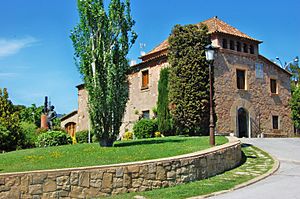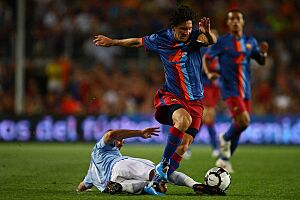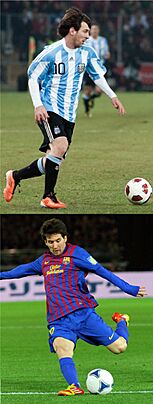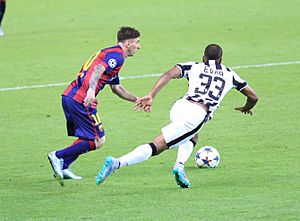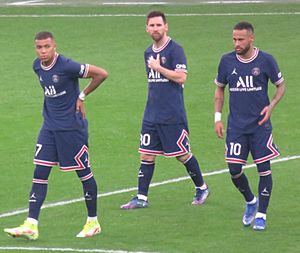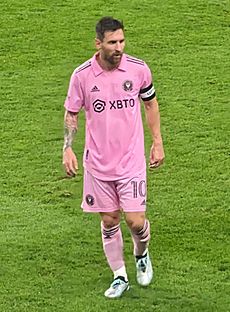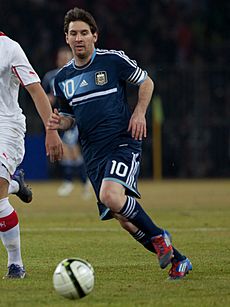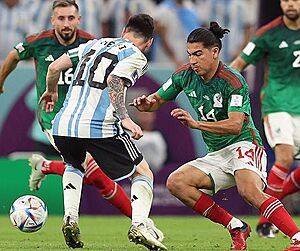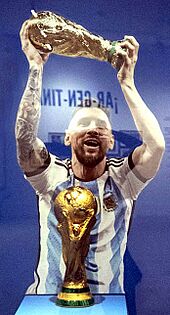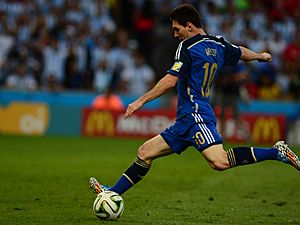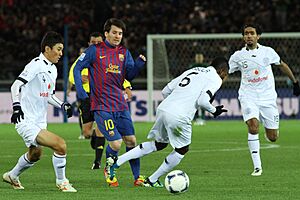Lionel Messi facts for kids
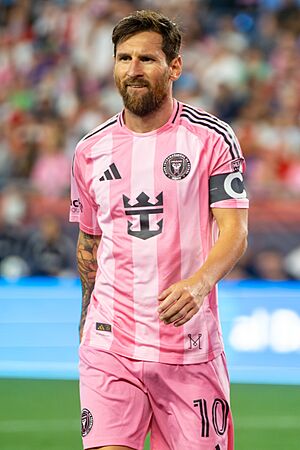
Messi with Inter Miami in 2025
|
||||||||||||||||||||||||||||||||||||||||||||||||||||||||||||||||
| Personal information | ||||||||||||||||||||||||||||||||||||||||||||||||||||||||||||||||
|---|---|---|---|---|---|---|---|---|---|---|---|---|---|---|---|---|---|---|---|---|---|---|---|---|---|---|---|---|---|---|---|---|---|---|---|---|---|---|---|---|---|---|---|---|---|---|---|---|---|---|---|---|---|---|---|---|---|---|---|---|---|---|---|---|
| Full name | Lionel Andrés Messi | |||||||||||||||||||||||||||||||||||||||||||||||||||||||||||||||
| Date of birth | 24 June 1987 | |||||||||||||||||||||||||||||||||||||||||||||||||||||||||||||||
| Place of birth | Rosario, Santa Fe, Argentina | |||||||||||||||||||||||||||||||||||||||||||||||||||||||||||||||
| Height | 1.70 m (5 ft 7 in) | |||||||||||||||||||||||||||||||||||||||||||||||||||||||||||||||
| Position(s) | Forward | |||||||||||||||||||||||||||||||||||||||||||||||||||||||||||||||
| Team information | ||||||||||||||||||||||||||||||||||||||||||||||||||||||||||||||||
|
Current team
|
Inter Miami | |||||||||||||||||||||||||||||||||||||||||||||||||||||||||||||||
| Number | 10 | |||||||||||||||||||||||||||||||||||||||||||||||||||||||||||||||
| Youth career | ||||||||||||||||||||||||||||||||||||||||||||||||||||||||||||||||
| 1992–1995 | Grandoli | |||||||||||||||||||||||||||||||||||||||||||||||||||||||||||||||
| 1995–2000 | Newell's Old Boys | |||||||||||||||||||||||||||||||||||||||||||||||||||||||||||||||
| 2000–2004 | Barcelona | |||||||||||||||||||||||||||||||||||||||||||||||||||||||||||||||
| Senior career* | ||||||||||||||||||||||||||||||||||||||||||||||||||||||||||||||||
| Years | Team | Apps | (Gls) | |||||||||||||||||||||||||||||||||||||||||||||||||||||||||||||
| 2003–2004 | Barcelona C | 10 | (5) | |||||||||||||||||||||||||||||||||||||||||||||||||||||||||||||
| 2004–2005 | Barcelona B | 22 | (6) | |||||||||||||||||||||||||||||||||||||||||||||||||||||||||||||
| 2004–2021 | Barcelona | 520 | (474) | |||||||||||||||||||||||||||||||||||||||||||||||||||||||||||||
| 2021–2023 | Paris Saint-Germain | 58 | (22) | |||||||||||||||||||||||||||||||||||||||||||||||||||||||||||||
| 2023– | Inter Miami | 53 | (50) | |||||||||||||||||||||||||||||||||||||||||||||||||||||||||||||
| International career‡ | ||||||||||||||||||||||||||||||||||||||||||||||||||||||||||||||||
| 2004–2005 | Argentina U20 | 18 | (14) | |||||||||||||||||||||||||||||||||||||||||||||||||||||||||||||
| 2008 | Argentina U23 | 5 | (2) | |||||||||||||||||||||||||||||||||||||||||||||||||||||||||||||
| 2005– | Argentina | 196 | (115) | |||||||||||||||||||||||||||||||||||||||||||||||||||||||||||||
|
Medal record
|
||||||||||||||||||||||||||||||||||||||||||||||||||||||||||||||||
|
||||||||||||||||||||||||||||||||||||||||||||||||||||||||||||||||
| *Club domestic league appearances and goals, correct as of 00:28, 19 October 2025 (UTC) ‡ National team caps and goals, correct as of 19:20, 14 November 2025 (UTC) |
||||||||||||||||||||||||||||||||||||||||||||||||||||||||||||||||
Lionel Andrés "Leo" Messi, born on June 24, 1987, is an amazing Argentine professional footballer. He plays as a forward and is the captain for both Major League Soccer club Inter Miami and the Argentina national team. Many people think he is one of the greatest players ever.
Messi has won many awards during his career. These include eight Ballon d'Ors and six European Golden Shoes. FIFA has also named him the world's best player eight times. In 2025, he was called the All Time Men's World Best Player by the IFFHS. He has won a record 45 team trophies, more than any other player in football history.
He holds many records, like scoring the most goals in a calendar year (91). He also scored the most goals for a single club (672 for Barcelona). Messi has the most goals in La Liga (474) and the most assists in international football (61). He has contributed to the most goals in both the FIFA World Cup (21) and the Copa América (32). Messi has scored over 890 senior career goals and made over 400 assists. This makes him the player with the most goal contributions in the sport's history, with over 1,290.
Messi started playing for Barcelona at age 17 in October 2004. He quickly became a key player. In the 2008–09 season, he helped Barcelona win their first "treble" in Spanish football. A treble means winning three major trophies in one season. This led to Messi winning his first of four Ballon d'Or awards in a row. By the 2011–12 season, he set a European record for most goals in a season. He also became Barcelona's all-time top scorer.
In the 2014–15 season, he became the all-time top scorer in La Liga. He led Barcelona to another historic treble, earning him a fifth Ballon d'Or in 2015. He became Barcelona's captain in 2018 and won a record sixth Ballon d'Or in 2019. With Barcelona, Messi won a club-record 34 trophies. These included ten La Liga titles and four Champions League titles. Due to financial challenges at Barcelona, Messi moved to French club Paris Saint-Germain in August 2021. He won the Ligue 1 title in both seasons he played there. In July 2023, he joined MLS club Inter Miami.
For Argentina, Messi is the national team's all-time leading goalscorer. He is also their most-capped player. After his debut in 2005, he won a gold medal at the 2008 Summer Olympics. He became captain in 2011. He led Argentina to three finals in a row: the 2014 World Cup, the 2015 Copa América, and the Copa América Centenario. They lost all three. After a brief retirement from international football in 2016, he returned. He helped his country qualify for the 2018 World Cup.
Messi was key in ending Argentina's 28-year wait for a trophy by winning the 2021 Copa América. This helped him win his seventh Ballon d'Or that year. The next year, he led Argentina to win the 2022 World Cup. This was the country's first World Cup win in 36 years. He then won a record-extending eighth Ballon d'Or in 2023. Messi also won the 2024 Copa América, his third major international title.
Messi has worked with sportswear company Adidas since 2006. France Football reported that he was the world's highest-paid footballer for five years between 2009 and 2014. Forbes named him the world's highest-paid athlete in 2019 and 2022. Time magazine included Messi in their 100 most influential people in the world list in 2011, 2012, and 2023. In 2020 and 2023, he won the Laureus World Sportsman of the Year award. He was the first team-sport athlete to achieve this. In 2020, Messi was part of the Ballon d'Or Dream Team. He also became the second footballer to earn over $1 billion in his career. After joining Inter Miami and making a big impact on football in the US, Time named him Athlete of the Year in 2023. In 2025, US President Joe Biden gave him the Presidential Medal of Freedom.
Contents
- Messi's Early Life and Football Dreams
- Messi's Youth Football Journey
- Messi's Club Career Highlights
- Barcelona: Rising to Stardom (2004–2008)
- Guardiola's Era: Unstoppable Success (2008–2012)
- Record-Breaking Years (2012–2014)
- The MSN Trio and More Trebles (2014–2017)
- Final Years at Barcelona (2017–2021)
- Paris Saint-Germain: A New Chapter (2021–2023)
- Inter Miami: Making Waves in the USA (2023–Present)
- Messi's International Career with Argentina
- Messi's Player Profile
- Messi's Personal Life
- Career Statistics
- Honours and Awards
- Interesting Facts About Lionel Messi
- Lionel Messi Quotes
- See also
Messi's Early Life and Football Dreams
Growing Up in Rosario
Lionel Messi was born on June 24, 1987, in Rosario, Argentina. He was the third of four children. His father, Jorge, managed a steel factory, and his mother, Celia, worked in a magnet factory. Leo grew up in a family that loved football. He started playing the sport very early with his older brothers and cousins. Some of his cousins even became professional footballers too!
When he was four, he joined a local club called Grandoli. His father was his first coach there. His grandmother, Celia, was also a big supporter. She took him to practices and games. Her passing, just before his eleventh birthday, affected him deeply. Since then, he often looks up and points to the sky after scoring a goal to remember her.
Messi's Youth Football Journey
Playing for Newell's Old Boys
Messi has always been a fan of Newell's Old Boys, a team from his hometown of Rosario. He started playing for them when he was seven. During his six years there, he scored almost 500 goals! He was part of a special youth team called "The Machine of '87." This team was almost unbeatable. Messi would often show off his amazing ball tricks during halftime at the first team's games. His favorite player growing up was the Brazilian striker Ronaldo.
When he was 10, doctors found that he had a growth hormone deficiency. This meant he wasn't growing as much as other kids. He started special treatment at age 11. This treatment was very expensive. Newell's Old Boys first agreed to help pay but later couldn't keep their promise. Another club, River Plate, wanted to sign him and offered to pay for his treatment. However, Newell's Old Boys would not let him leave, so the transfer didn't happen.
Joining FC Barcelona's Academy
Since Messi's family had relatives in Spain, they arranged a tryout with Barcelona in September 2000. The team's director, Carles Rexach, was very impressed and wanted to sign him right away. But it was unusual for European clubs to sign such young foreign players. On December 14, Barcelona showed their commitment by offering Messi a contract on a paper napkin!
In February 2001, Messi and his father moved to Barcelona. They lived near the club's stadium, Camp Nou. During his first year, he couldn't play in many games because of rules about foreign players. He felt a bit lonely and missed his family. His mother and siblings moved back to Argentina, while he stayed with his father. He was so quiet that some teammates thought he couldn't speak!
After a year at Barcelona's youth academy, La Masia, Messi could finally play in all games. He quickly made friends with teammates like Cesc Fàbregas and Gerard Piqué. After finishing his growth treatment at 14, Messi became a key player for Barcelona's best-ever youth team, known as the "Baby Dream Team." In his first full season (2002–03), he scored 36 goals in 30 games. His team won three major trophies. In one final, he played with a mask after breaking his cheekbone. He took it off and scored two goals in just 10 minutes! Even though other clubs wanted him, Messi chose to stay with Barcelona.
Messi moved up through the club's youth teams very quickly. He played for four different youth teams in the 2003–04 season. He was so good that he was called up to train with the first team. French player Ludovic Giuly said Messi amazed everyone in training. "He destroyed us all," Giuly said. "He would dribble past four players and score a goal. He was an alien."
"It seemed as if he had been playing with us all his life."
At 16 years old, Messi made his first-team debut in a friendly match on November 16, 2003. His performance impressed everyone. He started training daily with the reserve team and weekly with the first team. Barcelona's star player, Ronaldinho, quickly befriended Messi. Ronaldinho even told his teammates that Messi would become an even better player than him. This helped Messi feel more comfortable with the senior squad.
To get more experience, Messi also played for Barcelona C. He scored five goals in ten games, including three goals in eight minutes in one match. His first professional contract, signed in February 2004, lasted until 2012. It had a high buyout clause, meaning other clubs would have to pay a lot to sign him. He played five games for the B team that season. He worked hard to get stronger to compete with older, taller players. By the end of the season, he had scored 36 goals across all the teams he played for.
Messi's Club Career Highlights
Barcelona: Rising to Stardom (2004–2008)
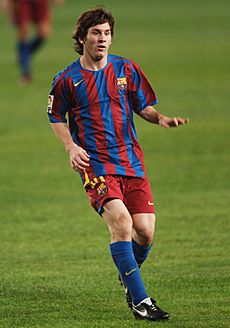
Messi became a regular player for the Barcelona B team in the 2004–05 season. Soon, he was promoted to the first team by manager Frank Rijkaard. He made his La Liga debut on October 16, 2004. He scored his first senior goal on May 1, 2005, becoming the club's youngest scorer at the time. Barcelona won the league title that season.
On his 18th birthday, he signed his first senior contract. It was a five-year deal with a huge release clause. His amazing performances led to a new nine-year contract three months later, doubling his salary.
In the 2005–06 season, Barcelona won La Liga again and the UEFA Champions League. Messi was injured and could not play in the Champions League final.
During the 2006–07 season, Messi scored three goals in a famous "Clásico" match against Real Madrid. This was the first time in 12 years a player had done that. He scored a beautiful goal against Getafe that reminded many of a famous goal by Argentine legend Diego Maradona. People started comparing Messi to Maradona, a comparison that would follow him throughout his career.
Guardiola's Era: Unstoppable Success (2008–2012)
In the 2008–09 season, under new manager Pep Guardiola, Messi received the number 10 shirt. He became the main player in Guardiola's team. He scored 38 goals that season, helping Barcelona achieve the first "treble" in Spanish football history. This meant winning the league, the Spanish cup, and the Champions League.
Barcelona also won three more trophies in the first half of the 2009–10 season. This made them the first club to win six trophies in a single year! Messi was the top scorer in the Champions League. In 2009, he won the Ballon d'Or and the FIFA World Player of the Year award. He scored 47 goals that season, matching a club record. He also won his first European Golden Shoe as Europe's top league scorer.
In the 2010–11 campaign, Messi helped Barcelona win the Spanish Supercup, the Champions League, and a third straight La Liga title. He won his second Ballon d'Or. Messi was the top scorer and assist provider in both the Champions League and La Liga. He became Barcelona's all-time top scorer in a single season with 53 goals.
"I feel sorry for those who want to compete for Messi's throne – it's impossible, this kid is unique."
Messi started the 2011–12 season by winning the Spanish and European Super Cups. He also won the FIFA Club World Cup and the Golden Ball award. In 2011, he received his third Ballon d'Or. In 2012, Messi became Barcelona's all-time top goalscorer at just 24 years old. He scored 50 goals in La Liga, a new record. His 73 goals in all competitions made him the top scorer in European club football history for a single season. Barcelona also won the Copa del Rey that season.
Record-Breaking Years (2012–2014)
In the 2012–13 season, Barcelona almost secured the La Liga title early. Messi broke the record for most goals scored in a calendar year, scoring an incredible 91 goals for Barcelona and Argentina in 2012. He won his fourth Ballon d'Or, becoming the first player ever to do so. He also wore the captain's armband for the first time in a league match. Barcelona won La Liga again, Messi's sixth league title. He finished as the top scorer in Spain and Europe for the second year in a row, winning his third European Golden Shoe.
Messi was incredibly important to the team's attack. He contributed to over 40% of Barcelona's goals by the end of the 2012–13 season. This showed how much the team relied on their star player.
To help Messi, Barcelona signed Brazilian forward Neymar before the 2013–14 season. The team won the Spanish Supercup. Messi still scored 41 goals, but Barcelona ended the season without a major trophy for the first time in five years.
The MSN Trio and More Trebles (2014–2017)
Barcelona hired coach Luis Enrique before the 2014–15 season. They also signed Uruguayan forward Luis Suárez. The attacking trio of Messi, Suárez, and Neymar, known as 'MSN', broke many goal-scoring records. Messi scored three goals in a match against Sevilla, making him the all-time top scorer in La Liga. Barcelona won the La Liga title, the Copa del Rey, and the Champions League. This made them the first club to win the continental treble twice! Messi scored 58 goals, and the MSN trio scored a record 122 goals together.
Messi started the 2015–16 season by helping Barcelona win the UEFA Super Cup. He also won his fifth club trophy of the year, the 2015 FIFA Club World Cup. On January 11, 2016, Messi won his record fifth FIFA Ballon d'Or. He ended the season by winning La Liga and the Copa del Rey again. Messi scored 41 goals, and the MSN trio broke their own record with 131 combined goals.
The 2016–17 season saw Messi win the Spanish Supercup and the Copa del Rey. He finished the season with 54 goals. His 37 goals in La Liga earned him both the Pichichi (top scorer in La Liga) and the European Golden Boot for the fourth time. The MSN trio scored 110 goals together. Neymar then left for Paris Saint Germain, ending the incredible trio.
Final Years at Barcelona (2017–2021)
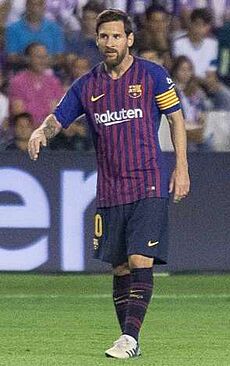
Messi signed a new contract with Barcelona on November 25, 2017, keeping him at the club until 2021. In the 2017–18 season, he helped the team win both La Liga and the Copa del Rey. He was again the top scorer in La Liga with 34 goals, winning his fifth European Golden Shoe. After captain Andrés Iniesta left in May 2018, Messi became the team's new captain for the 2018–19 season. He lifted his first trophy as captain, the Spanish Supercup. He led Barcelona to win the La Liga title, his tenth, and his first as captain. With 36 goals, he won his sixth league Golden Boot trophy and a record third straight Golden Shoe award.
Messi won his sixth Ballon d'Or. However, the 2019–20 season was the first time since 2007–08 that Barcelona didn't win any trophies. After this tough season, Messi wanted to leave the club, but he decided to stay for the final year of his contract. In the 2020–21 season, Messi broke Xavi's record for most appearances for the club, playing 768 games. He led the club to win the Copa del Rey. In his last two seasons with Barcelona, he was the top scorer in La Liga, earning a record eight Pichichi trophies.
Messi became a free agent when his contract ended. Barcelona faced financial problems, making it hard to sign a new deal. Barcelona announced that Messi would not be staying. In a sad press conference, Messi confirmed he was leaving the club he had played for his whole career.
Paris Saint-Germain: A New Chapter (2021–2023)
On August 10, 2021, Messi joined Ligue 1 club Paris Saint-Germain (PSG). He reunited with his former teammate Neymar. He signed a two-year deal until June 2023. Messi chose the number 30 shirt, the same number he wore when he first started playing for Barcelona as a teenager. He made his debut against Reims and scored his first goal for PSG in a Champions League match against Manchester City.
In 2021, Messi scored 40 goals for his club and country. He also captained Argentina to win the 2021 Copa América. For these achievements, he received a record seventh Ballon d'Or. He finished his first season with PSG with 11 goals and 14 assists. He helped the club win their 10th Ligue 1 title.
At the start of the 2022–23 season, Messi won his second trophy with PSG, the French Supercup. He scored a goal against Nice, making him the all-time highest goalscorer in European club football with 702 goals. He also reached 1,000 career goal contributions at club level. By the end of the season, he had 21 goals and 16 assists in the league. This helped PSG win their 11th Ligue 1 title, his second in a row. After the season, PSG confirmed Messi would be leaving the club.
Inter Miami: Making Waves in the USA (2023–Present)
Major League Soccer (MLS) club Inter Miami CF announced they signed Messi on a two-and-a-half-year contract on July 15, 2023. Messi's arrival in the US was a huge event. Many people said his presence helped make MLS more popular in the US and around the world. Every game he played caused a rush for tickets, with many famous people wanting to watch him. This excitement was called "Messimania." His Inter Miami jersey became the best-selling jersey in the league and almost the world.
Messi made his 2023 debut in a Leagues Cup match. He scored a winning free-kick in the final moments of the game. He became the team captain. After scoring nine goals in his first six games, Messi led Inter Miami to win their first-ever trophy, the Leagues Cup final. He made his MLS debut against the New York Red Bulls. Inter Miami missed the playoffs that year. On October 30, 2023, Messi was awarded a record-extending eighth Ballon d'Or. He was also named Time Athlete of the Year, the first footballer to win this award.
During the 2024 season, Messi set new MLS records. He had five assists and six goal contributions in one game against the New York Red Bulls. On October 2, he scored two goals against the Columbus Crew, helping his team win the Supporters' Shield, his 46th trophy. In the last game of the regular season on October 19, he scored his first three goals for the club in a 6–2 victory. Inter Miami finished with a league-record 74 points. He ended the regular season with 20 goals and 16 assists in 19 matches. He became Inter Miami's all-time top goalscorer. Miami made their first playoff appearance but were eliminated in the first round. Messi scored his first playoff goal in their third game. He was named the MLS Most Valuable Player for the season.
In the 2025 season, Messi became the fastest player to reach 40 goals in league history. He was featured in a Super Bowl commercial for Apple TV's MLS coverage. He finished the season winning the MLS Golden Boot as the league's top scorer, with 29 goals and 19 assists in 28 games. On October 23, Messi signed a three-year contract extension, keeping him at the club until 2028.
Messi's International Career with Argentina
Youth and Olympic Success
Messi could play for both Argentina and Spain because he had dual citizenship. He first played for Argentina's U20 team in 2004. He helped them finish third in the 2005 South American U-20 Championship. Messi then led the team to win the 2005 FIFA World Youth Championship, his first trophy with Argentina. He scored six goals and made two assists, winning the Golden Ball award as the best player.
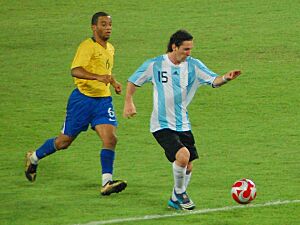
Messi made his debut with the senior national team in 2005 at age 18. He scored his first international goal in a friendly match against Croatia. His World Cup debut was in the 2006 FIFA World Cup. He became the youngest player to represent and score for Argentina in the World Cup. He played in the 2007 Copa América, where Argentina lost in the final. Messi was named the best young player of the tournament. In the 2008 Summer Olympics, he led Argentina's U23 team to win the Olympic gold medal. FIFA recognized him as the best player from the tournament's top team.
Captaincy and World Cup Challenges
Messi was given Argentina's number 10 shirt. He wore the captain's armband for the first time in a 2010 FIFA World Cup group stage match. Argentina was eliminated in the quarter-finals. Messi was still seen as one of the tournament's best players for his speed and creativity. Before the 2011 Copa América, Argentina started building their team around Messi. However, they lost in the quarter-finals.
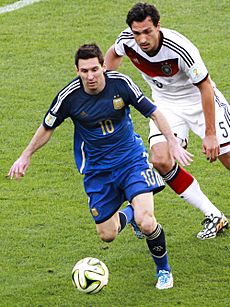
After this, a 24-year-old Messi was made the captain of the squad. The next few years were frustrating for Messi as Argentina couldn't win an international trophy. In the 2014 FIFA World Cup, Argentina lost to Germany in the final. Messi was awarded the Golden Ball as the best player of the tournament. Argentina then lost to Chile in the final in 2015. Messi reportedly turned down the Golden Ball award for that tournament. In the 2016 Copa América Centenario semi-final, Messi scored a goal that made him Argentina's all-time leading goalscorer. But Argentina again lost to Chile in the final.
Losing three finals in three years made Messi decide to retire from international football. However, a huge campaign in Argentina convinced him to come back. He returned to lead his team to the 2018 FIFA World Cup. In a crucial qualifying match against Ecuador, Messi scored three goals to secure their spot. Argentina lost to France in the round of 16 at the World Cup. The next year, Argentina finished third in the 2019 Copa América. This victory started a 36-game unbeaten streak for Argentina that lasted over three years.
World Cup Glory and More Records
Messi finally ended Argentina's 28-year wait for a trophy by winning the 2021 Copa América. In a group stage match, he became Argentina's most-capped player. Argentina beat Brazil in the final, and Messi was named player of the tournament. He was involved in nine of Argentina's 12 goals, scoring four and assisting five. He then captained Argentina to win another international trophy, the 2022 Finalissima, where he was named player of the match.
At the 2022 FIFA World Cup, Messi led Argentina to their first World Cup victory in 36 years. He scored twice in the final against France. With seven goals and three assists, Messi won the Golden Ball again, becoming the first player to win it twice. His appearance in the final also set new records for most World Cup appearances (26) and goal contributions (21).
In a 2023 friendly match, Messi scored three goals against Curaçao. This made him the third player and first South American to reach 100 international goals. Later that year, he became the all-time top goalscorer in South American World Cup qualifiers. During the 2024 Copa América semi-final, Messi scored his only goal of the tournament. This made him the second-highest international goalscorer of all time. Argentina won the final against Colombia, securing their second consecutive Copa América title. Messi also set a new record for most appearances (39) at the Copa América. In 2025, he tied the record for most appearances in South American World Cup qualification matches (72). He also reached 60 assists in international football, making him the top assist-provider in men’s international football history.
Messi's Player Profile
How Messi Plays Football
Because he is not very tall, Messi has a lower center of gravity. This helps him change direction quickly and avoid tackles. The Spanish media even call him La Pulga Atómica ("The Atomic Flea"). Even though he isn't big, he is very strong in his upper body. This helps him stay on his feet when defenders challenge him. He is known for rarely pretending to be hurt, which is called "diving" in football. His short, strong legs help him accelerate quickly. His fast feet allow him to keep control of the ball while dribbling at top speed. His former coach, Pep Guardiola, once said, "Messi is the only player that runs faster with the ball than he does without it." Messi mainly uses his left foot. He uses the outside of his left foot to start dribbling and the inside to shoot, pass, and assist.
Messi is a fantastic goalscorer. He is known for his accurate shots, good positioning, and quick reactions. He also makes smart runs to get past defenders. He is also a great playmaker, meaning he creates chances for others. He has amazing vision and can make many different types of passes. People often describe him as a magician, creating goals and opportunities out of nowhere. He is also very good at free kicks and penalty kicks. As of July 2025, Messi ranks third all-time in goals from direct free kicks. He is also known for scoring with chips over the goalkeeper.
Messi's speed and skill allow him to dribble past many defenders towards the goal. He often starts these runs from the halfway line or the right side of the field. Many consider him one of the greatest dribblers ever. His former Argentina manager, Diego Maradona, said, "The ball stays glued to his foot; I've seen great players in my career, but I've never seen anyone with Messi's ball control." Besides his individual skills, he is also a hard-working team player. He is known for his creative passes and teamwork, especially with former Barcelona midfielders Xavi and Andrés Iniesta.
As he got older, Messi started to play in deeper areas of the field. He became one of the best passers and playmakers in football history. He also ran less without the ball, saving his energy for quick bursts of speed. This helped him play more efficiently and avoid injuries. He improved his fitness by having a stricter diet, training, and sleep schedule.
Messi's Positions on the Field
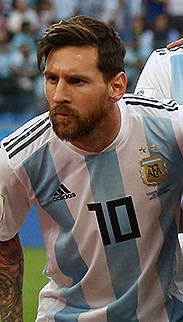
Messi plays a free attacking role. He is a versatile player, meaning he can attack from either side of the field or through the middle. When he was a child, he liked playing as a playmaker behind two strikers. But he started his career in Spain as a left-winger. His first manager, Frank Rijkaard, moved him to the right wing. From there, he could cut into the middle and shoot with his left foot.
Under manager Guardiola, he often played as a "false nine." This meant he was positioned as a center-forward but would drop deep into midfield. This would draw defenders away, creating space for passes, other players' runs, or his own dribbling.
Under manager Luis Enrique, Messi sometimes played on the right side again. In later seasons, he played a deeper, free playmaking role. Under manager Ernesto Valverde, Messi played in various roles. He was sometimes a second striker, linking up with midfielders and creating chances for his attacking partner Luis Suárez. With the Argentina national team, Messi has also played in many attacking positions. He has been on the right wing, as a false nine, as a main striker, or in a deeper, creative role as a classic number 10 playmaker.
Messi's Personal Life
Family and Close Relationships
Since 2008, Messi has been with Antonela Roccuzzo. They married on June 30, 2017, in their hometown of Rosario. Messi has known Roccuzzo since he was five years old. She is the cousin of his childhood best friend, Lucas Scaglia. Messi first confirmed their relationship in an interview in January 2009.
Messi and Roccuzzo have three sons. To celebrate his partner's first pregnancy, Messi put the ball under his shirt after scoring a goal in June 2012. Thiago was born in Barcelona on November 2, 2012. In April 2015, Messi confirmed they were expecting another child. In October 2017, his wife announced they were expecting their third child.
Messi has a very close relationship with his family. His mother, Celia, has her face tattooed on his left shoulder. His father, Jorge, has been his agent since he was 14. His oldest brother, Rodrigo, manages his daily schedule and public appearances. His mother and other brother, Matías, manage his charity, the Leo Messi Foundation. They also handle personal and professional matters in Rosario.
Even after moving to Spain at age 13, Messi has stayed connected to his hometown of Rosario. He still has his family's old house there. He also has an apartment for his mother and a family home just outside the city. He once drove three hours from Buenos Aires to Rosario after practice to have dinner with his family. He keeps in touch daily with a small group of friends from Rosario. Messi has always planned to return to Rosario to finish his playing career at Newell's. Messi has triple citizenship: he is a citizen of Argentina, Italy, and Spain.
Career Statistics
Club
| Club | Season | League | National cup | Continental | Other | Total | ||||||
|---|---|---|---|---|---|---|---|---|---|---|---|---|
| Division | Apps | Goals | Apps | Goals | Apps | Goals | Apps | Goals | Apps | Goals | ||
| Barcelona C | 2003–04 | Tercera División | 10 | 5 | — | — | — | 10 | 5 | |||
| Barcelona B | 2003–04 | Segunda División B | 5 | 0 | — | — | — | 5 | 0 | |||
| 2004–05 | Segunda División B | 17 | 6 | — | — | — | 17 | 6 | ||||
| Total | 22 | 6 | 0 | 0 | 0 | 0 | 0 | 0 | 22 | 6 | ||
| Barcelona | 2004–05 | La Liga | 7 | 1 | 1 | 0 | 1 | 0 | — | 9 | 1 | |
| 2005–06 | La Liga | 17 | 6 | 2 | 1 | 6 | 1 | 0 | 0 | 25 | 8 | |
| 2006–07 | La Liga | 26 | 14 | 2 | 2 | 5 | 1 | 3 | 0 | 36 | 17 | |
| 2007–08 | La Liga | 28 | 10 | 3 | 0 | 9 | 6 | — | 40 | 16 | ||
| 2008–09 | La Liga | 31 | 23 | 8 | 6 | 12 | 9 | — | 51 | 38 | ||
| 2009–10 | La Liga | 35 | 34 | 3 | 1 | 11 | 8 | 4 | 4 | 53 | 47 | |
| 2010–11 | La Liga | 33 | 31 | 7 | 7 | 13 | 12 | 2 | 3 | 55 | 53 | |
| 2011–12 | La Liga | 37 | 50 | 7 | 3 | 11 | 14 | 5 | 6 | 60 | 73 | |
| 2012–13 | La Liga | 32 | 46 | 5 | 4 | 11 | 8 | 2 | 2 | 50 | 60 | |
| 2013–14 | La Liga | 31 | 28 | 6 | 5 | 7 | 8 | 2 | 0 | 46 | 41 | |
| 2014–15 | La Liga | 38 | 43 | 6 | 5 | 13 | 10 | — | 57 | 58 | ||
| 2015–16 | La Liga | 33 | 26 | 5 | 5 | 7 | 6 | 4 | 4 | 49 | 41 | |
| 2016–17 | La Liga | 34 | 37 | 7 | 5 | 9 | 11 | 2 | 1 | 52 | 54 | |
| 2017–18 | La Liga | 36 | 34 | 6 | 4 | 10 | 6 | 2 | 1 | 54 | 45 | |
| 2018–19 | La Liga | 34 | 36 | 5 | 3 | 10 | 12 | 1 | 0 | 50 | 51 | |
| 2019–20 | La Liga | 33 | 25 | 2 | 2 | 8 | 3 | 1 | 1 | 44 | 31 | |
| 2020–21 | La Liga | 35 | 30 | 5 | 3 | 6 | 5 | 1 | 0 | 47 | 38 | |
| Total | 520 | 474 | 80 | 56 | 149 | 120 | 29 | 22 | 778 | 672 | ||
| Paris Saint-Germain | 2021–22 | Ligue 1 | 26 | 6 | 1 | 0 | 7 | 5 | — | 34 | 11 | |
| 2022–23 | Ligue 1 | 32 | 16 | 1 | 0 | 7 | 4 | 1 | 1 | 41 | 21 | |
| Total | 58 | 22 | 2 | 0 | 14 | 9 | 1 | 1 | 75 | 32 | ||
| Inter Miami | 2023 | MLS | 6 | 1 | 1 | 0 | — | 7 | 10 | 14 | 11 | |
| 2024 | MLS | 19 | 20 | — | 3 | 2 | 3 | 1 | 25 | 23 | ||
| 2025 | MLS | 28 | 29 | — | 7 | 5 | 11 | 8 | 46 | 42 | ||
| Total | 53 | 50 | 1 | 0 | 10 | 7 | 21 | 19 | 85 | 76 | ||
| Career total | 663 | 557 | 83 | 56 | 173 | 136 | 51 | 42 | 970 | 791 | ||
International
| Team | Year | Competitive | Friendly | Total | |||
|---|---|---|---|---|---|---|---|
| Apps | Goals | Apps | Goals | Apps | Goals | ||
| Argentina U20 | 2004 | — | 2 | 3 | 2 | 3 | |
| 2005 | 16 | 11 | — | 16 | 11 | ||
| Total | 16 | 11 | 2 | 3 | 18 | 14 | |
| Argentina U23 | 2008 | 5 | 2 | — | 5 | 2 | |
| Total | 5 | 2 | 0 | 0 | 5 | 2 | |
| Argentina | 2005 | 3 | 0 | 2 | 0 | 5 | 0 |
| 2006 | 3 | 1 | 4 | 1 | 7 | 2 | |
| 2007 | 10 | 4 | 4 | 2 | 14 | 6 | |
| 2008 | 6 | 1 | 2 | 1 | 8 | 2 | |
| 2009 | 8 | 1 | 2 | 2 | 10 | 3 | |
| 2010 | 5 | 0 | 5 | 2 | 10 | 2 | |
| 2011 | 8 | 2 | 5 | 2 | 13 | 4 | |
| 2012 | 5 | 5 | 4 | 7 | 9 | 12 | |
| 2013 | 5 | 3 | 2 | 3 | 7 | 6 | |
| 2014 | 7 | 4 | 7 | 4 | 14 | 8 | |
| 2015 | 6 | 1 | 2 | 3 | 8 | 4 | |
| 2016 | 10 | 8 | 1 | 0 | 11 | 8 | |
| 2017 | 5 | 4 | 2 | 0 | 7 | 4 | |
| 2018 | 4 | 1 | 1 | 3 | 5 | 4 | |
| 2019 | 6 | 1 | 4 | 4 | 10 | 5 | |
| 2020 | 4 | 1 | — | 4 | 1 | ||
| 2021 | 16 | 9 | — | 16 | 9 | ||
| 2022 | 10 | 8 | 4 | 10 | 14 | 18 | |
| 2023 | 5 | 3 | 3 | 5 | 8 | 8 | |
| 2024 | 9 | 4 | 2 | 2 | 11 | 6 | |
| 2025 | 3 | 2 | 2 | 1 | 5 | 3 | |
| Total | 138 | 63 | 58 | 52 | 196 | 115 | |
| Career total | 159 | 74 | 60 | 55 | 219 | 131 | |
Honours and Awards
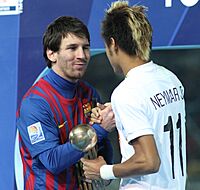
Barcelona
- La Liga: 2004–05, 2005–06, 2008–09, 2009–10, 2010–11, 2012–13, 2014–15, 2015–16, 2017–18, 2018–19
- Copa del Rey: 2008–09, 2011–12, 2014–15, 2015–16, 2016–17, 2017–18, 2020–21
- Supercopa de España: 2006, 2009, 2010, 2011, 2013, 2016, 2018
- UEFA Champions League: 2005–06, 2008–09, 2010–11, 2014–15
- UEFA Super Cup: 2009, 2011, 2015
- FIFA Club World Cup: 2009, 2011, 2015
Paris Saint-Germain
- Ligue 1: 2021–22, 2022–23
- Trophée des Champions: 2022
Inter Miami
- Supporters' Shield: 2024
- Leagues Cup: 2023
Argentina U20
Argentina U23
- Olympic Games: 2008
Argentina
- FIFA World Cup: 2022
- Copa América: 2021, 2024
- Finalissima: 2022
Individual
- Ballon d'Or: 2009, 2010, 2011, 2012, 2015, 2019, 2021, 2023
- FIFA World Player of the Year/FIFA Ballon d'Or/The Best FIFA Men's Player: 2009, 2010, 2011, 2012, 2015, 2019, 2022, 2023
- European Golden Shoe: 2009–10, 2011–12, 2012–13, 2016–17, 2017–18, 2018–19
- FIFA World Cup Golden Ball: 2014, 2022
- FIFA World Cup Silver Boot: 2022
- FIFA Club World Cup Golden Ball: 2009, 2011
- FIFA U-20 World Cup Golden Ball: 2005
- FIFA U-20 World Cup Golden Boot: 2005
- UEFA Club Footballer of the Year: 2008–09
- UEFA Men's Player of the Year Award: 2010–11, 2014–15
- UEFA Champions League top scorer: 2008–09, 2009–10, 2010–11, 2011–12, 2014–15, 2018–19
- Copa América Golden Ball: 2015, 2021
- Copa América Golden Boot: 2021
- La Liga Best Player: 2008–09, 2009–10, 2010–11, 2011–12, 2012–13, 2014–15, 2016–17, 2017–18, 2018–19
- MLS Most Valuable Player: 2024
- Pichichi Trophy: 2009−10, 2011–12, 2012−13, 2016–17, 2017−18, 2018–19, 2019–20, 2020–21
- MLS Golden Boot: 2025
- Laureus World Sportsman of the Year: 2020, 2023
- TIME Athlete of the Year: 2023
- IFFHS World's Best Player: 2022
- Ballon d'Or Dream Team: 2020
- FIFPRO World 11: 2007, 2008, 2009, 2010, 2011, 2012, 2013, 2014, 2015, 2016, 2017, 2018, 2019, 2020, 2021, 2022, 2023
- Argentine Sportsperson of the Year: 2011, 2021, 2022, 2023
- Argentine Footballer of the Year: 2005, 2007, 2008, 2009, 2010, 2011, 2012, 2013, 2015, 2016, 2017, 2019, 2020, 2021, 2022, 2023
Orders
 Creu de Sant Jordi, Catalonia (30 April 2019)
Creu de Sant Jordi, Catalonia (30 April 2019) Presidential Medal of Freedom, United States (4 January 2025)
Presidential Medal of Freedom, United States (4 January 2025)
Interesting Facts About Lionel Messi
- Messi has Italian and Spanish family roots from his father's side, and mostly Italian roots from his mother's side.
- His maternal grandmother, Celia, was a big influence on him. She took him to training and matches. She passed away just before his eleventh birthday. Since then, Messi celebrates his goals by looking up and pointing to the sky to honor her.
- His favorite player growing up was Ronaldo, whom Messi called "the best forward I've ever seen."
- Messi holds triple citizenship: he is a citizen of Argentina, Italy, and Spain.
- His favorite foods include asado (a traditional South American barbecue), milanesa (a type of breaded meat), and pasta. He prefers his mate (a traditional South American drink) unsweetened.
- Time magazine named Messi one of the 100 most influential people in the world in 2011, 2012, and 2023.
- He won the Laureus World Sportsman of the Year in 2020 and 2023, becoming the first team-sport athlete to win this award.
- Messi is often compared to Portuguese forward Cristiano Ronaldo, and they have an ongoing rivalry.
- In February 2021, Messi donated the Adidas shoes he wore when he broke Pelé's record for most goals for a single club (644 goals for Barcelona) to a museum. The shoes were later sold at auction for charity to help children with cancer, raising £125,000.
Lionel Messi Quotes
- "Sometimes you have to accept you can't win all the time."
- "You have to fight to reach your dream. You have to sacrifice and work hard for it."
- "The day you think there is no improvements to be made is a sad one for any player."
- "I have fun like a child in the street. When the day comes when I'm not enjoying it, I will leave football."
See also
 In Spanish: Lionel Messi para niños
In Spanish: Lionel Messi para niños
- European Cup and UEFA Champions League records and statistics
- La Liga records and statistics
- List of Argentina international footballers
- List of association football rivalries
- List of FC Barcelona players
- List of FC Barcelona records and statistics
- List of Paris Saint-Germain FC players
- List of Inter Miami CF players
- List of FIFA World Cup winning players
- List of largest sports contracts
- List of men's footballers with 50 or more international goals
- List of men's footballers with 100 or more international caps
- List of men's footballers with 500 or more goals
- List of men's footballers with the most official appearances
- List of most-followed Instagram accounts
- List of most-liked Instagram posts
- List of players who have appeared in the most FIFA World Cups
- List of top international men's football goalscorers by country



